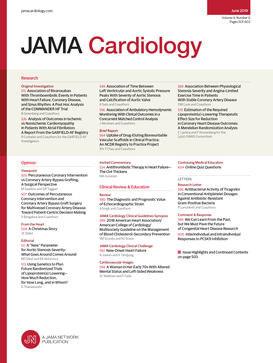Polygenic Susceptibility in Peripartum, Alcohol-Induced, and Cancer Therapy-Related Cardiomyopathies.
IF 14.1
1区 医学
Q1 CARDIAC & CARDIOVASCULAR SYSTEMS
引用次数: 0
Abstract
Importance Rare monogenic variants linked to nonischemic dilated cardiomyopathy (DCM) are enriched among individuals with secondary cardiomyopathies, such as peripartum (PPCM), alcohol-induced (ACM), and cancer therapy-related (CCM) cardiomyopathies. However, it remains unclear whether a polygenic predisposition to DCM also contributes to these conditions. Objective To assess the association of a DCM polygenic score with PPCM, ACM, and CCM, and to evaluate the contributions of monogenic and polygenic susceptibilities to these secondary cardiomyopathies. Design, Setting, and Participants This was a retrospective genetic association analysis of data from the Mass General Brigham (MGB) Biobank (n = 42 137, 2008-2025), with replication in the UK Biobank (n = 295 160, 2005-2010), FinnGen (n = 417 950, 2017-2025), and the Veterans Affairs Million Veteran Program (n = 516 066, 2011-2025). In MGB Biobank, medical records were reviewed to ascertain secondary cardiomyopathy cases and antecedent clinical risk factors. Exposures DCM polygenic risk score and DCM monogenic variants. Main Outcomes and Measures The primary outcomes were the association of the DCM polygenic risk score with PPCM, ACM, and CCM and the prevalence of monogenic variants and a high polygenic score among individuals with cardiomyopathy. Results The mean (SD) age in the MGB Biobank was 55.7 (17.0) years at enrollment, and 24 551 (58.3%) were female. Across the 4 study cohorts, 3414 individuals with secondary cardiomyopathy were identified, including 70 with PPCM, 2281 with ACM, and 1063 with CCM. The DCM polygenic score was associated with PPCM (odds ratio [OR], 1.82 per SD; 95% CI, 1.43-2.30), ACM (OR, 1.56; 95% CI,1.34-1.82), and CCM (OR, 1.64; 95% CI,1.24-2.15) (all with P < .001). Monogenic variants were enriched but present in 7 of 113 individuals with medical record-reviewed cardiomyopathy in MGB, while 66 had a high polygenic score, which conferred an approximately 3-fold increased odds of cardiomyopathy. Most individuals with cardiomyopathy lacked antecedent clinical risk factors. Conclusions and Relevance In this cohort study, individuals with PPCM, ACM, and CCM were enriched for monogenic DCM variants and a high DCM polygenic score, suggesting a shared genetic susceptibility influenced by distinct environmental precipitants. These findings support a shared genetic architecture between secondary cardiomyopathies and DCM, although additional work with larger numbers of individuals with cardiomyopathy is needed to confirm these findings.围产期、酒精诱发和癌症治疗相关心肌病的多基因易感性
与非缺血性扩张型心肌病(DCM)相关的单基因变异在继发性心肌病(如围产期(PPCM)、酒精诱导(ACM)和癌症治疗相关(CCM)心肌病)患者中丰富。然而,目前尚不清楚多基因易感性是否也会导致这些疾病。目的评估DCM多基因评分与PPCM、ACM和CCM的相关性,并评估单基因和多基因易感性对这些继发性心肌病的影响。设计、环境和参与者本研究对来自麻省总医院布里格姆生物银行(MGB)的数据进行回顾性遗传关联分析(n = 42 137,2008-2025),并在英国生物银行(n = 295 160,2005-2010)、芬兰生物银行(n = 417 950,2017-2025)和退伍军人事务百万退伍军人计划(n = 516 066,2011-2025)中进行复制。在MGB生物银行中,我们回顾了医疗记录,以确定继发性心肌病病例和先前的临床危险因素。暴露DCM多基因风险评分和DCM单基因变异。主要结果和测量主要结果是DCM多基因风险评分与PPCM、ACM和CCM的相关性,以及心肌病患者中单基因变异的患病率和高多基因评分。结果入组时,MGB生物库的平均(SD)年龄为55.7(17.0)岁,其中24例 551例(58.3%)为女性。在4个研究队列中,确定了3414例继发性心肌病患者,其中PPCM 70例,ACM 2281例,CCM 1063例。DCM多基因评分与PPCM(比值比[OR], 1.82 / SD; 95% CI, 1.43-2.30)、ACM (OR, 1.56; 95% CI,1.34-1.82)和CCM (OR, 1.64; 95% CI,1.24-2.15)相关(均P < 0.001)。113例MGB心肌病患者中有7例存在单基因变异,而66例多基因评分较高,这使得心肌病的几率增加了约3倍。大多数心肌病患者缺乏先前的临床危险因素。结论和相关性在这项队列研究中,PPCM、ACM和CCM患者的DCM单基因变异丰富,DCM多基因评分较高,表明他们具有共同的遗传易感性,受不同环境因素的影响。这些发现支持继发性心肌病和DCM之间共享的遗传结构,尽管需要对大量心肌病患者进行额外的研究来证实这些发现。
本文章由计算机程序翻译,如有差异,请以英文原文为准。
求助全文
约1分钟内获得全文
求助全文
来源期刊

JAMA cardiology
Medicine-Cardiology and Cardiovascular Medicine
CiteScore
45.80
自引率
1.70%
发文量
264
期刊介绍:
JAMA Cardiology, an international peer-reviewed journal, serves as the premier publication for clinical investigators, clinicians, and trainees in cardiovascular medicine worldwide. As a member of the JAMA Network, it aligns with a consortium of peer-reviewed general medical and specialty publications.
Published online weekly, every Wednesday, and in 12 print/online issues annually, JAMA Cardiology attracts over 4.3 million annual article views and downloads. Research articles become freely accessible online 12 months post-publication without any author fees. Moreover, the online version is readily accessible to institutions in developing countries through the World Health Organization's HINARI program.
Positioned at the intersection of clinical investigation, actionable clinical science, and clinical practice, JAMA Cardiology prioritizes traditional and evolving cardiovascular medicine, alongside evidence-based health policy. It places particular emphasis on health equity, especially when grounded in original science, as a top editorial priority.
 求助内容:
求助内容: 应助结果提醒方式:
应助结果提醒方式:


